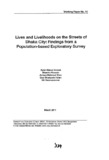| dc.contributor.advisor | Poverty--Environmental aspects. | |
| dc.contributor.author | Ahmed, Syed Masud | |
| dc.contributor.author | Hossain, Shamim | |
| dc.contributor.author | Khan, Antora Mahmud | |
| dc.contributor.author | Islam, Qazi Shafayetul | |
| dc.contributor.author | Kamruzzaman, Md. | |
| dc.date.accessioned | 2019-12-05T10:26:06Z | |
| dc.date.available | 2019-12-05T10:26:06Z | |
| dc.date.issued | 2011-03 | |
| dc.identifier.citation | Ahmed, S. M., Hossain, S., Khan, A. M., Islam, Q. S., & Kamruzzaman, M. (2011, March). Lives and livelihoods on the streets of Dhaka city: findings from a population-based exploratory survey. Research Reports (2010): Economic Studies, Vol - XXVII, 134–189. | en_US |
| dc.identifier.uri | http://hdl.handle.net/10361/13220 | |
| dc.description.abstract | BRAC has long been working to empower people and communities in situations of
poverty, illiteracy, disease and social injustice. In recent years, BRAC has extended
its activities to include the urban poor population living in the slums. As a continuation
of this, and to be more inclusive, BRAC is going to implement innovative programmes
for the street dwellers (who sleep on streets, railway terminals and platforms, bus
stations, parks and open spaces, religious centres, construction sites and around
graveyards and in other public places with no room in scale. BRAC Research and
Evaluation Division carried out an exploratory cross-sectional survey on a sample of
these populations from 10 purposely selected areas of Dhaka city to gather
information on their lives and livelihoods, using both quantitative and qualitative
methods. Findings reveal that the street dwellers (driven by poverty and natural
disasters) had to adopt a very precarious and humiliating life on the streets devoid of
all basic amenities of life, under constant threat of eviction and harassment by the
law-enforcing agencies and hoodlums. They were hard-working when considered in
terms of working hours, but without proportionate return due to their involvement in
low paying informal sector which is also irregular. They failed to improve their lot even
after five or more years of street-living. According to them housing, food, and lack of
jobs were the three most common problems for which they sought assistance. The
implication of these findings for programme development is discussed. | en_US |
| dc.language.iso | en | en_US |
| dc.publisher | BRAC | en_US |
| dc.subject | Social injustice | en_US |
| dc.subject | Poverty | en_US |
| dc.subject | Urban poor | en_US |
| dc.title | Lives and livelihoods on the streets of Dhaka city: findings from a population-based exploratory survey | en_US |
| dc.type | Research report | en_US |

